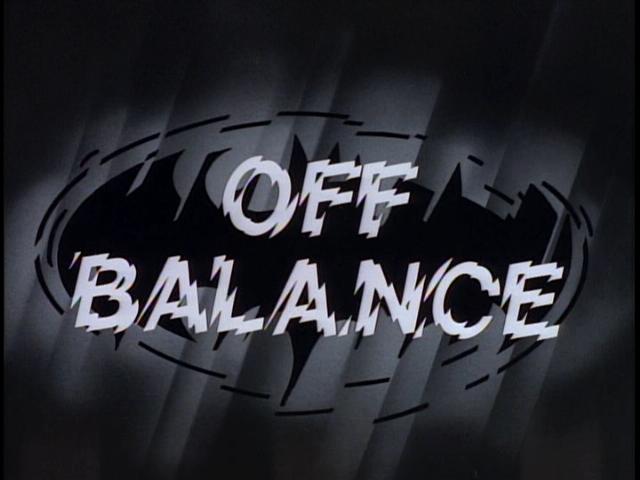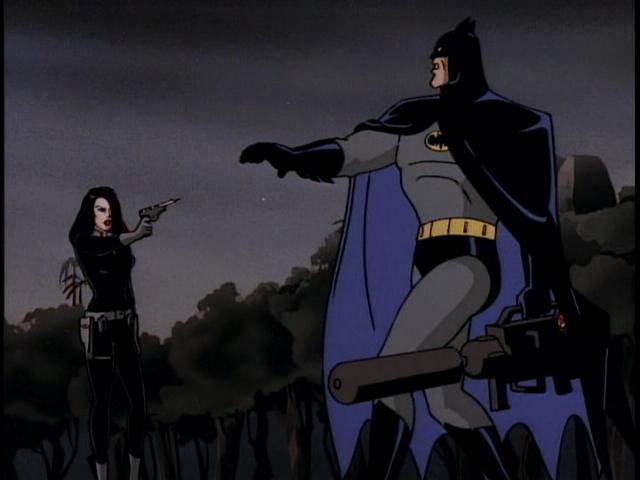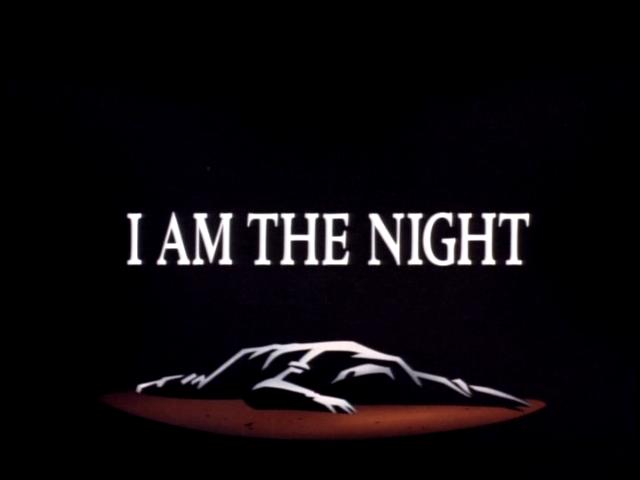“I Am the Night”
Written by Michael Reaves
Directed by Boyd Kirkland
Episode #049
Music Composed by Michael McCuistion
Animation Services by Sunrise
Original Airdate – November 9th, 1992
Plot: After Commissioner Gordon is shot on the anniversary of the Waynes’ death, a weary Batman considers hanging it all up.
The writing credit is for series story editor Michael Reaves, but “I Am the Night” reads like it was written by a college freshman who has just taken an intro to philosophy class. There’s the quotes from Robert Frost, George Santayana, and Friedrich Nietzsche. There’s the existential whinging about whether anything we do in this life actually matters. There’s the clutching at the sky and milking the giant cow and even Kevin Conroy can’t sell lines like “‘Promises to keep’, Leslie. ‘I have promises to keep.’”
Look, I like melodramatic angst as much as the next guy, but if there’s any character I never want to hear whining about their life it’s Batman. Bruce, you’re a genius billionaire playboy philanthropist, when you’re not a ninja scientist detective. If I wanted this level of self-pity in a superhero, I’d read Spider-Man.

Batman quitting because he’s not doing enough just doesn’t make sense. We’ve seen Batman doesn’t like being Batman before (in another episode by Reaves), but “Perchance to Dream” showed Bruce would only quit if a) his parents were still alive and b) there were another Batman there to take over. And even then he could not stop being Batman.
Batman quitting doesn’t even make sense within the context of “I Am the Night.” If he believes Gordon was shot because he didn’t get to the stake-out early enough, or fight hard enough to capture the Jazzman, then Batman should be doubling and tripling his efforts, not giving up altogether.
It doesn’t help that Jimmy “the Jazzman” Peake is an ordinary gangster like Rupert Thorne, Arnold Stromwell, and Tony Zucco. If he were one of the costumed criminals then one could argue that Batman inspired or attracted supervillains to come to Gotham. But instead the Jazzman is exactly the type of crook that dominated Gotham before Batman started, the kind that Batman absolutely destroys with his vigilante tactics. (Though, hey, nice work kids show explicitly saying a cop was shot by a drug dealer).
As with “Vendetta,” there’s a great episode hidden here had Reaves focused on a different aspect. For example, despite being a constant presence in the series, there aren’t that many episodes about Jim Gordon. “I Am the Night” gives some insight into how Batman sees him, and unsurprisingly it’s as another replacement father figure. Gordon is the same age as Thomas Wayne, and when he’s shot he falls exactly as Thomas fell. Therefore, when Gordon wakes up and says he wishes he was a hero like Batman, once again a surrogate father is telling Bruce how proud he is of him. It doesn’t hurt that Bob Hastings does the most with the few lines he has.

The guest performers this episode are strong all around (possibly to make up for how bad Conroy is this time). If “Almost Got ‘Im” was a showcase for the rogues gallery, “I Am the Night” shows off Batman’s supporting cast. Alfred, Dick, Barbara, Bullock, and Leslie Thompkins all get moments to shine in this episode. Even when Bullock blames Batman for Gordon getting shot, he’s only voicing Batman’s inner doubts. And later Bullock runs up four flights of stairs to save Gordon’s life.
Dick Grayson, in his civilian persona, particularly comes off well, because if there’s anyone’s life that Bruce Wayne has improved, it’s the boy he saved, raised, inspired, and trained to be a superhero. Loren Lester does a stand-out job being Bruce Wayne’s son this episode, the only person that can reach his old man in his lowest moment. Dick spends most of the episode in civilian clothes, getting into his Robin costume only long enough for Bruce to tell him to take the night off, he’s got this. Because, as episode after episode has shown, Bruce Wayne cannot risk anyone’s life but his own, which is what makes this whole crisis of faith so off-note.
There’s also a cameo voice from young Seth Green as a grifter Batman accidentally inspires to go straight. Like Batman himself in this episode, he’s great when he’s being blustery on the street, and then weak when he’s being sincere.
This is also a gorgeously animated episode. Boyd Kirkland and Sunrise create lush and sweeping images, especially Batman’s one man raid on the Jazzman’s hideout. And Michael McCuistion uses the Jazzman’s jazz and the somber setting to create one of the more evocative, emotional scores of the series.
I just wish such A-list work could have supported a better story.

“Off Balance”
Written by Len Wein
Directed by Kevin Altieri
Episode #050
Music Composed by Mark Koval, Michael McCuistion
Animation by Sunrise
Original Airdate – November 23rd, 1992
Plot: The perception warping Vertigo and the Society of Shadows steal a sonic drill from Wayne Enterprises, and Batman must team up with the mysterious Talia to recover it.
Oh, hello McCuiston and Sunrise! So this is what you look like when working on a good script.
Of course, that the script for “Off Balance” is good is something of a surprise, since Len Wein is also responsible for “Moon of the Wolf,” the absolute worst episode of Batman: The Animated Series. The major difference is that there, Wein was directly adapting a terrible issue of Batman, whereas here he’s loosely adapting one of the best issues, Detective Comics #411, “Into the Den of the Death-Dealers,” the issue that introduced Talia al Ghul.

Len Wein’s script is a master class in economic storytelling, introducing three new villains, a secret society, and the DC Animated Universe’s first major on-going story arc, a conflict that spills out over a half-dozen more episodes and into two other series. Wein does this by giving just enough information about everyone. Ra’s al Ghul, the arch villain in charge, isn’t ever named and only appears in a cameo at the end, but he’s voiced by David Warner and swears this isn’t over, so we know he’s a big deal. Vertigo, a complicated and conflicted anti-hero in the comics, is reduced to his super power, a cool visual, and an inexplicable German accent, provided by Michael York. And everything we learn about the Society of Shadows we learn in the first few minutes: they are involved in a lot of crime in Gotham; each member is a ninja with Wolverine claws; and they would rather kill themselves than be captured.
But the focus of “Off Balance” is Talia, Ra’s daughter, who is as much a Bond girl as her dad is a Bond villain. She’s the classic femme fatale, a seductive beauty that professes to love Batman but betrays him again, and again, and again, her mysterious, duplicitous nature conveyed by hiding half her face at all times. Supergirl Helen Slater gives Talia a vague Mediterranean accent, reflective of her Bond girl influences, Hebrew name, and Arabic father. That she has any accent is a little weird, considering her father, who is also Arabic and has lived for 700 years, has the perfect British tones of David Warner. Of course, if I could sound like David Warner, I would too.
Wein really nails the Talia/Batman relationship. In contrast to Catwoman, who Batman refuses to encourage, Batman immediately hits on Talia. And Talia continues to flirt with Batman even after she betrays him. (“It could have been… sweet.”) Their mutual attraction is based on competence. Batman sees that Talia is a badass martial artist, and Talia warms to him after he navigates a death trap laboratory. The line, “I don’t do ‘helpless’” is admittedly pretty sexy (and where was this Batman last episode?). Clearly, the perfect woman for Batman would be a female superhero. Too bad there aren’t any… yet.

There’s an unusual moment at the end. Talia and Batman recover the sonic drill a little after midnight, and then there’s a tasteful fade to dawn as Batman leaves with an awkward “Well, this was fun….” Please provide your own theories about what they were doing for those few hours before Batman had to take off.
This is also a very violent episode! Besides the two Shadows who kill themselves (or rather, “erase their own minds”), two other characters fall to their deaths. Sure, they fall into water, but unlike the Joker, there’s no hint that we’ll see them again, and in fact we never, ever do. For such a brutal episode, it’s a little surprising that the villainous organization is called the Society of Shadows instead of the League of Assassins. We can watch a snitch, named Twitch, played by veteran snitch Chick Vennera, drown, but we can’t call the agents that killed him assassins? (But then, Christopher Nolan did the same thing, so…)
Probably unsurprising, considering the name of the villain, but the influence of Alfred Hitchcock is all over Kevin Altieri’s direction, especially the bell tower chase at the end. Vertigo’s defeat and fall mirrors perfectly the last scene of Vertigo, naturally, while Batman and Talia fighting bad guys and figuring out if they can trust each other recalls Hitchcock’s spy films like North by Northwest and The Man Who Knew Too Much. And the opening on the Statue of Liberty (Or, rather, Gotham’s Statue of Justice) homages the end of Saboteur.
Not that aping Hitchcock is Altieri’s only card. The sequences involving Vertigo’s nauseating powers are impressively disorienting, using a garish yellow, rack focus techniques, and McCuistion’s unsettling score to place the viewer in Batman’s nightmarish world. Or, rather, Talia’s world, since Batman can do what the viewer can’t, close his eyes and use his other senses to understand what’s going on. By saying he closed his eyes, Altieri and Wein reveal that we the audience never really see things the way Batman does, and from the outside Batman is scary impressive.
Steven Padnick is a freelance writer and editor. By day. You can find more of his writing and funny pictures at padnick.tumblr.com.










